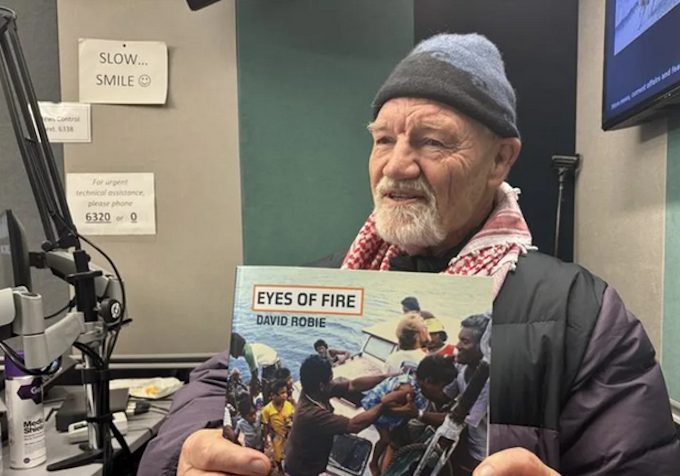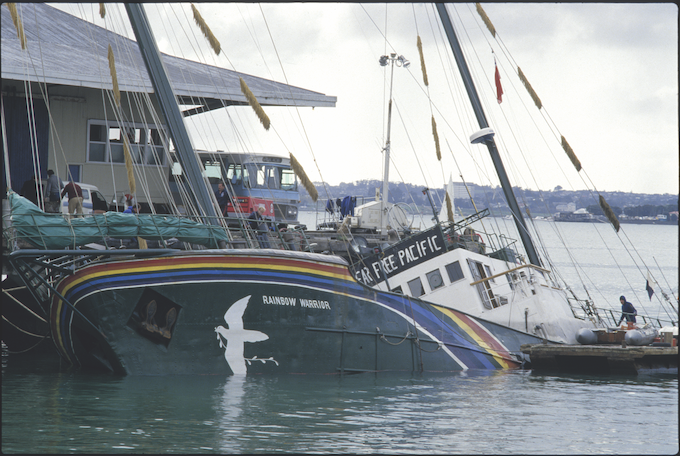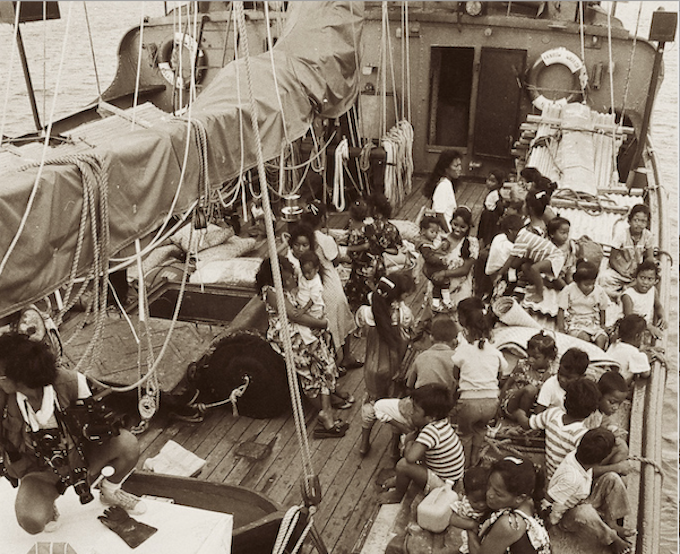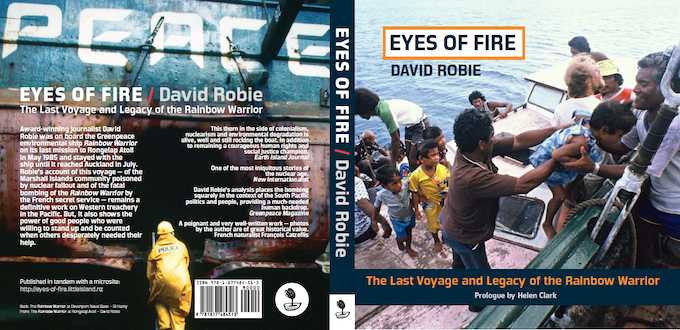By Susana Suisuiki and Lydia Lewis
The New Zealand government needs to do more for its Pacific Island neighbours and stand up to nuclear powers, a distinguished journalist, media educator and author says.
Professor David Robie, a recipient of the New Zealand Order of Merit (MNZM), released the latest edition of his book Eyes of Fire: The last voyage and Legacy of the Rainbow Warrior (Little Island Press), which highlights the nuclear legacies of the United States and France.
Dr Robie, who has worked in Pacific journalism and academia for more than 50 years, recounts the crew’s experiences aboard the Greenpeace flagship the Rainbow Warrior in 1985, before it was bombed in Auckland Harbour.
- LISTEN: Dr David Robie talks to RNZ Pacific last week
- Crimes NZ: David Robie on the bombing of the Rainbow Warrior — RNZ Afternoons
- Other Eyes of Fire reports

At the time, New Zealand stood up to nuclear powers, he said.
“It was pretty callous [of] the US and French authorities to think they could just carry on nuclear tests in the Pacific, far away from the metropolitan countries, out of the range of most media, and just do what they like,” Dr Robie told RNZ Pacific. “It is shocking, really.”

Speaking to Pacific Waves, Dr Robie said that Aotearoa had “forgotten” how to stand up for the region.
“The real issue in the Pacific is about climate crisis and climate justice. And we’re being pushed this way and that by the US [and] by the French. The French want to make a stake in their Indo-Pacific policies as well,” he said.
‘We need to stand up’
“We need to stand up for smaller Pacific countries.”
Dr Robie believes that New Zealand is failing with its diplomacy in the region.

He accused the coalition government of being “too timid” and “afraid of offending President Donald Trump” to make a stand on the nuclear issue.
However, a spokesperson for New Zealand Foreign Minister Winston Peters told RNZ Pacific that New Zealand’s “overarching priority . . . is to work with Pacific partners to achieve a secure, stable, and prosperous region that preserves Pacific sovereignty and agency”.
The spokesperson said that through its foreign policy “reset”, New Zealand was committed to “comprehensive relationships” with Pacific Island countries.
“New Zealand’s identity, prosperity and security are intertwined with the Pacific through deep cultural, people, historical, security, and economic linkages.”
The New Zealand government commits almost 60 percent of its development funding to the region.
Legends of a Nuclear Free and Independent Pacific. Video: Talanoa TV
Pacific ‘increasingly contested’
The spokesperson said that the Pacific was becoming increasingly contested and complex.
“New Zealand has been clear with all of our partners that it is important that engagement in the Pacific takes place in a manner which advances Pacific priorities, is consistent with established regional practices, and supportive of Pacific regional institutions.”
They added that New Zealand’s main focus remained on the Pacific, “where we will be working with partners including the United States, Australia, Japan and in Europe to more intensively leverage greater support for the region.
“We will maintain the high tempo of political engagement across the Pacific to ensure alignment between our programme and New Zealand and partner priorities. And we will work more strategically with Pacific governments to strengthen their systems, so they can better deliver the services their people need,” the spokesperson said.

However, former New Zealand prime minister Helen Clark, writing in the prologue of Dr Robie’s book, said: “New Zealand needs to re-emphasise the principles and values which drove its nuclear-free legislation and its advocacy for a nuclear-free South Pacific and global nuclear disarmament.”
Dr Robie added that looking back 40 years to the 1980s, there was a strong sense of pride in being from Aotearoa, the small country which set an example around the world.
“We took on . . . the nuclear powers,” Dr Robie said.
“And the bombing of the Rainbow Warrior was symbolic of that struggle, in a way, but it was a struggle that most New Zealanders felt a part of, and we were very proud of that [anti-nuclear] role that we took.
“Over the years, it has sort of been forgotten”.
‘Look at history’
France conducted 193 nuclear tests over three decades until 1996 in French Polynesia.
Until 2009, France claimed that its tests were “clean” and caused no harm, but in 2010, under the stewardship of Defence Minister Herve Morin, a compensation law was passed.
From 1946 to 1962, 67 nuclear bombs were detonated in the Marshall Islands by the US.

In 2024, then-US deputy secretary of state Kurt Campbell, while responding to a question from RNZ Pacific about America’s nuclear legacy, said: “Washington has attempted to address it constructively with massive resources and a sustained commitment.”
However, Dr Robie said that was not good enough and labelled the destruction left behind by the US, and France, as “outrageous”.
“It is political speak; politicians trying to cover their backs and so on. If you look at history, [the response] is nowhere near good enough, both by the US and the French.”
Susana Suisuiki is RNZ Pacific Waves presenter/producer, and Lydia Lewis is RNZ Pacific presenter/bulletin editor. This article is republished under a community partnership agreement with RNZ.

